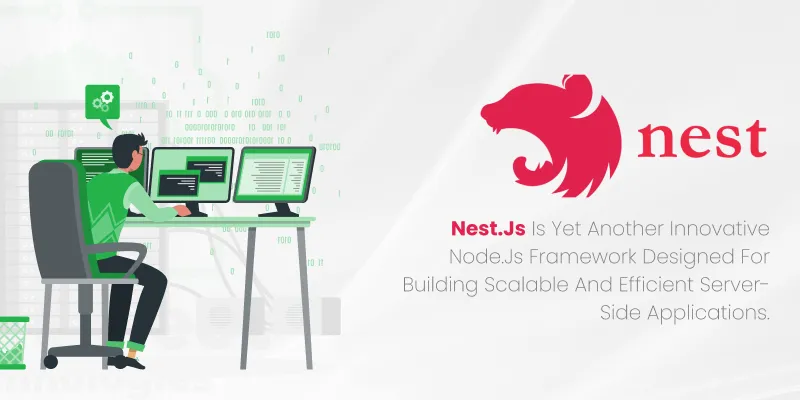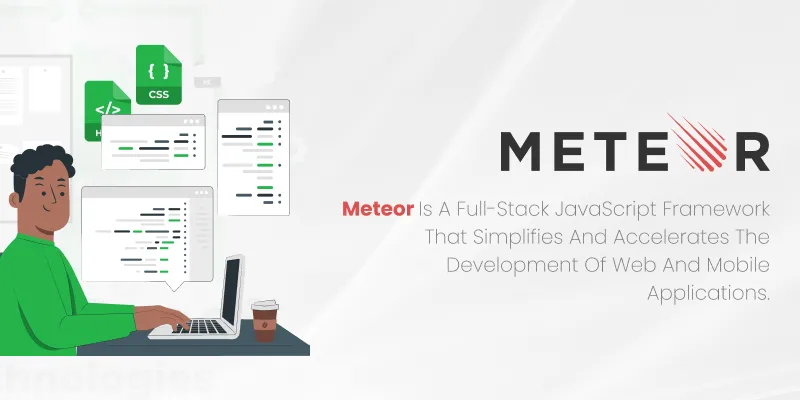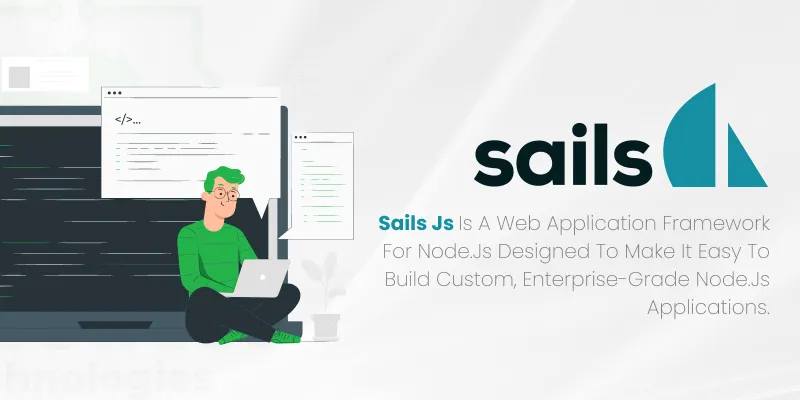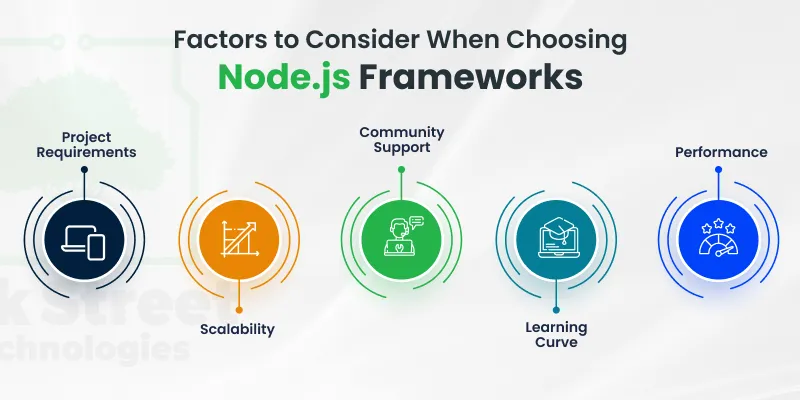We are living in an era where the digital landscape is undergoing a change with fast-paced rapidity, requiring businesses and individuals alike to keep pace with it in terms of equipping themselves with the required paraphernalia.
In such a scenario, Node.js has emerged as a significant change. It is an open-source, cross-platform JavaScript runtime environment that has captured the hearts of both developers and businesses worldwide. At the core of Node.js lies its unique ability to handle many connections simultaneously while conveniently keeping applications highly responsive.
However, Node.js is not just about the runtime environment; it is also about the frameworks that make development smoother, more efficient, and enjoyable. As a developer, choosing the right Node.js framework can make a world of difference in your project’s success. It is not just about writing code; it is about building a robust, scalable, and high-performance application that can sufficiently fulfill the demands of today’s dynamic digital landscape.
This blog is being written with the intent to guide you in this decision-making process. We will navigate the Node.js framework landscape, explore the top options available, and provide you with the insights you need to make an informed choice.
Let’s begin with the basic understanding of it.
Top 4 Best Node.js Frameworks
Now, it is time to dive into the exciting world of Node.js frameworks where we will explore some of the leading options available, each with its own unique strengths and areas of specialization.
Express.js

Known mainly for its minimalist nature, Express.js stands as one of the most popular and minimalist Node.js frameworks. This lightweight framework does not reinvent the wheel but focuses on providing a set of essential features for building web applications and APIs. Its simplicity and flexibility make it a top choice for developers who prefer a minimalist structure and need to quickly get their applications up and running without much ado. Express.js boasts a vast and active community that consistently develops middleware and extensions, further extending its capabilities.
Nest.js

Nest.js is yet another innovative Node.js framework designed for building scalable and efficient server-side applications. It commands some versatility owing to its very nature that it takes inspiration from various programming paradigms, including Object-Oriented Programming (OOP), Functional Programming (FP), and Functional Reactive Programming (FRP). This unique approach makes it an attractive choice for developers as it offers a powerful, extensible, and maintainable architecture. Particularly, it is an excellent choice for complex, enterprise-level applications where a structured and organized codebase is a must.
Meteor.js

Meteor.js is another valuable framework, a full-stack JavaScript celebrated for its real-time application capabilities. With Meteor.js, you can build web, mobile, and desktop applications using a single code base. This framework comes with a range of highly availing pros as it simplifies the development process by providing a rich set of features, including data synchronization in real-time, which is ideal for applications requiring instant updates and interactions. It is quite in vogue these days among developers for usefulness in various aspects as discussed.
Sails.js

Sails.js is a full-featured Model-View-Controller (MVC) framework tailored for building web applications. Particularly, it is well-suited for creating data-driven APIs and real-time features and is known for its flexibility and adaptability, making it an excellent choice for projects with dynamic requirements and complex data structures. This adaptability and flexibility make it a to-go choice for developers and sets it apart from other frameworks.
Factors to Consider When Choosing a Node.js Framework

When selecting a Node.js framework, it is highly pertinent to consider various factors to ensure that your choice aligns with your project’s needs and your development team’s capabilities. Let’s explore these critical considerations in detail:
Project Requirements: firstly, to choose a well-suited Node.js framework, it is essential to thoroughly understand your project’s specific requirements. Does your project involve building a RESTful API, real-time applications, or a data-driven web application? Bear in mind that different Node.js frameworks are tailored to specific use cases, so matching your project’s needs to the framework’s strengths is highly crucial.
Scalability: Secondly, consider your project’s growth potential. If your application is expected to handle a rapidly increasing number of users and data, you will need a framework that can scale effectively. Remember that some Node.js frameworks are better equipped to handle scalability, while others may require additional effort and resources to scale up, so it all must be driven by your needs.
Community Support: A vibrant and supportive community can indubitably be an invaluable resource for developers. When issues arise or when you need guidance, a strong community can provide invaluable answers and solutions. It is highly recommended that before choosing a framework, assess the community’s size, activity, and the availability of documentation, as these factors can significantly impact your development experience.
Learning Curve:Node.js frameworks come with varying levels of complexity and difficulty. So, it is advisable to consider your development team’s familiarity with the framework and the time required for onboarding. Remember that a steep learning curve can slow down your project, while a more accessible framework may allow you to hit the ground running. You have to be particular.
Performance:Performance is a critical consideration for any application. Different Node.js frameworks have varying levels of performance optimization. You need to be vigilant in choosing a framework and ensure that it seamlessly meets your performance expectations and ensures that your application responds swiftly, especially during high traffic periods.
Read More About: No Code Web Application Development
Case Studies
To further illuminate the importance of Node.js frameworks in real-world applications, it is time to delve deep into some of the noteworthy case studies. Case studies work as a testimonial that attests to the credibility, validity, and authenticity of anything/framework. When it comes to Nodejs. framework, some major companies, and startups alike have harnessed the power of it to create innovative and highly successful applications. Some of the popular case studies include the following:
- Uber: Uber, the ridesharing giant, relies heavily on Node.js and its associated frameworks for building real-time features and ensuring the smooth and unhindered functioning of its app. The framework’s scalability and real-time capabilities work in its favor as its precious asset that effortlessly enables handling millions of requests in real-time.
- Netflix: Netflix, the well-known, global streaming service, uses Node.js and Express.js to enhance the user experience. To the credit of express.js is that it helps Netflix serve fast, dynamic content to users, ensuring seamless playback and personalization features in real time.
- LinkedIn: LinkedIn, the increasingly growing professional networking platform, employs Node.js frameworks to create interactive and real-time features. These frameworks enable seamless messaging, updates, and profile views in real time, enhancing user engagement. The interaction and real-time features that LinkedIn affords is owing to Nodejs framework and that is what makes it truly valuable.
Having studied all these case studies it can now be safely said that the choice of a Node.js framework can significantly impact an application’s performance, scalability, and real-time capabilities. Sometimes it is advisable to seek the help of reliable partners like Oak Street Technologies, who have expertise and experience in delivering excellence, for better and smooth realization of your ideation. These real-world examples demonstrate the versatility and power of Node.js frameworks across different industries and conspicuously externalize its worthwhileness for developers and businesses alike.
Conclusion
Succinctly, Node.js frameworks play a pivotal role in the success of your web application development projects and embracing its potential could bring unprecedented results. These frameworks are dissimilar from each other in various aspects, and each has unique strengths. The best choice depends on your project’s specific requirements, your development team’s expertise, and your performance expectations.
The Node.js ecosystem is vibrant and dynamic, offering a wealth of opportunities for innovation and success, but it solely depends on you to truly harness its potential. The question that might arise in your head is how to optimally harness its potential? The answer is simple though; by choosing your framework wisely or entrusting your project to a reliable outsourcing partner like Oak Street Technologies – a name to reckon with in the realm of web application development.
Our Nodejs development services help you with robust, scalable, and high-performance applications, fully equipped to meet the demands of today’s digital landscape. Contact us to set out on a Node.js journey that is characterized by continuous innovation and achievement.



